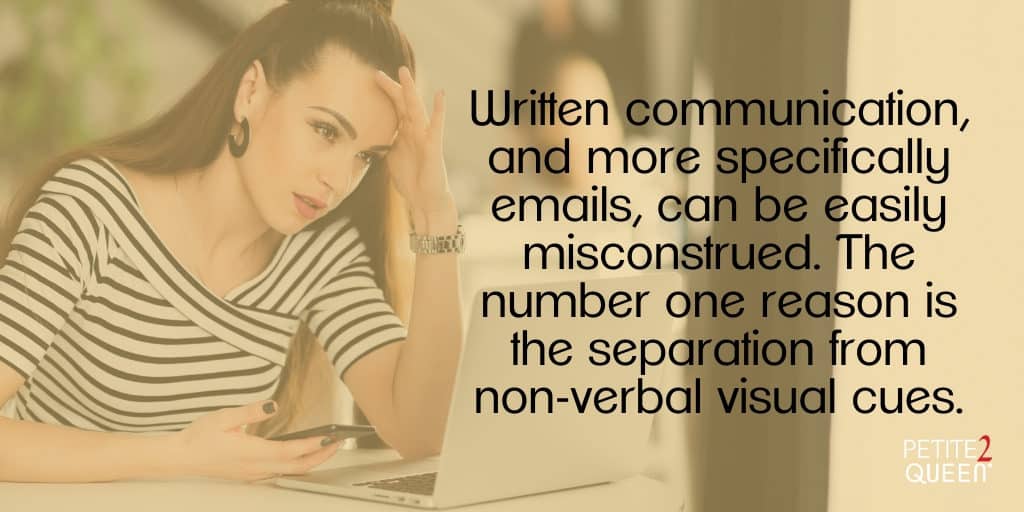My co-worker sent me an email I found disrespectful, but when I pointed that out, he said I was being too sensitive. I have to work with him on a daily basis. How do I navigate this situation? – Leslie in Jackson, MS
Answer:
There are two parts to tackle here: the email communication and a crucial conversation. First we need to dig deeper on the email itself to determine the next steps. My challenge for you is to step outside your paradigm and open yourself to alternate perspectives.
The Email
Written communication, and more specifically emails, can be easily misconstrued. The number one reason is the separation from non-verbal visual cues. Expert consensus is that only 7% of our message is conveyed with words. Emails are tricky, since you have lost all of the non-verbal communication. In addition, they are often written in haste and without careful consideration. It’s a knockout punch.
The Exception
If the email content was unlawful, obscene, defamatory, libelous, threatening, pornographic, harassing, hateful, racially or ethnically offensive, or encouraging conduct that would be considered a criminal offense, then you must immediately forward it to your human resources director and manger. Follow up by filing a written complaint.
Taking a Step Back
If you found the email disrespectful, take a step back. Ask yourself why you found it disrespectful six times. Asking six times helps you dig down to the root reason for your feelings. The key is to gain an understanding of why you perceived the email to be insulting. Don’t get me wrong, your feelings are valid. However, it’s possible you are projecting your feelings onto the sender, or reading far more than was ever intended into the email.
Ask a close friend or peer for their input on the email. Not someone you both work with! Take it out of your work environment for a neutral reading. Do it in person so you can pay attention to the non-verbal communication cues of your trusted confidant. Start with a request to review the email, without pre-conditioning your feelings or perceptions about it. In other words, don’t poison the well. After they give you their feedback, share your initial feelings about the email. Talking it over with an outside observer can help you gain perspective and may reveal insecurities.
Here’s an experience of mine to illustrate how I was projecting my feelings on my boss following his emails. One of my CEOs had a terse and authoritarian style to his emails. When I received them, I interpreted them as concerns on progress and results. I was sticking him with my self-limiting perfectionism, thinking I was not making enough progress or delivering the desired results. And it was all nonsense. He did not feel that way, and if he had, he would have told me so straight out. But for a few months I had myself in knots. It was not until I sought a crucial conversation that I was able to let go of my incorrect perception and effectively flex to his style.

Another Consideration
You’ve had that initial crucial conversation. Although your co-worker’s response that you were “too sensitive” was outrageously bad, it could be perfectly true that he had no intention whatsoever to be disrespectful.
If it feels bigger to you, examine if there is a pattern or other factors influencing your ability to accept his word. What about his in-person and verbal communications? Has he treated you with respect and professional courtesy in meetings, in person, on the phone, or on virtual calls? Get a handle on this.
Again, ask yourself six times and get the input from a neutral confidant. If your co-worker’s ongoing interaction is deemed inappropriate, bring in your supervisor or HR representative. These negative interplays are impacting your work. Be prepared to cite specific examples of the co-worker’s behavior and ask for assistance to remedy the situation.
However, if your co-worker has not demonstrated other areas of concern with his interactions, it’s time to let it go. Always choose your battles. It is a waste of your time, energy, and emotional resources to engage in needless confrontations.
Crucial Conversations
Now it’s time to revisit part two of this particular situation: the crucial conversation. You’ve already had this initial dialogue, and it appears not to have produced a desirable result. Your co-worker’s response that you were “too sensitive” was terrible because it completely belittled and negated your feelings. Putting that aside may be difficult. But, how you approach crucial conversations directly impacts the outcome. If it begins in an accusatory or combative manner, it will immediately produce the fight, flight, or freeze response. It will not produce an open dialogue, and could make it nearly impossible to find common ground.
Another key point I must include is to never have difficult conversations over email or text. You will be adding more potential misinterpretations onto the bonfire. It can quickly escalate, so don’t do it. Prepare for the conversation, have it as soon as possible, and follow the guidelines below.

Approach Discussion
Once you have reevaluated the email and consistent behavior of the sender, it’s time to take action. While sometimes the action is to take no action, in this situation a follow-up discussion is in order to clear the air. Do this in person or over a video call to read non-verbal cues. If you work in the same place, take it out of the building for coffee or lunch to introduce a more casual environment.
Carefully consider and incorporate each of the following factors before the conversation. First, remember to see the good in the other person. Second, recognize that you co-worker’s style or approach could be the polar opposite to yours, or simply different. Third, speak to his values, who he is, or who he wants to be. This is aligned with seeing your co-worker as a whole person. Forth, choose your words with care and utilize pauses. Words matter and help you demonstrate empathy and find common ground. Pauses enable your co-worker to digest what you have said and formulate a response. Finally, ask questions, listen, and seek mutually beneficial outcomes.
Re-Center the Conversation
During the conversation, you always must keep your emotions in check. Don’t take the bait to defend or deflect a response. Instead, re-center the discussion on the key takeaways. Get to your co-worker’s reasons for why he feels this way or followed this course. Remember that it was most likely unintentional. Ask for clarification by saying “help me understand” or “tell me more.” If the conversation starts to go off the rails, disengage. Either re-schedule or bring in your manager to help mediate. At the end of the day, it’s vital to have a good working relationship with your co-worker so you can achieve the goals and initiatives of the department and company.
Power Skills
Learning how to effectively deliver, participate, and respond to communications is a power skill. More than that, it is the cornerstone of organization success. While this situation is unpleasant, it is a great opportunity to expand your expertise. Look to the positive potential for professional development. We have a number of additional resources you can quickly review to take your next steps.
Resources
Check out Chapters 9 and 10 of our book, Practical Wisdoms @ Work, for a more in depth look at this challenge.
Here are some more resources that can help:

Lynn Whitbeck is the co-founder and President of Petite2Queen. She is focused on identifying and evaluating opportunities for women at work, helping them define their personal roadmap. She dedicates herself to delivering tools and insights, embracing visualization of the big picture, and identifying and implementing the minutiae of detail. Lynn aims to share lessons learned along her journey and enable positive uplift for women.

